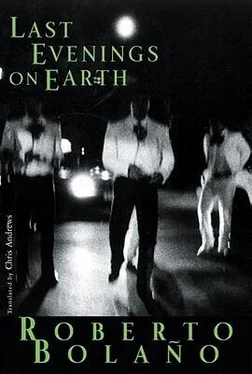He was already sick when he left Madrid, against the advice of various Argentinean doctors, who never billed him and had even arranged a couple of hospital stays, paid for by the national health insurance. Returning to Buenos Aires was a painful and happy experience. In the first week he started taking steps to locate Gregorio. He wanted to go back to his job at the university, but what with bureaucracy and the inevitable jealousies and bitterness, it wasn't going to happen, so he had to make do with translating for a couple of publishing houses. Carmela, however, got a teaching position and toward the end they lived exclusively on her earnings. Each week, Sensini wrote to Miranda. He knew he didn't have long to live, she said, and sometimes it was like he was impatient, like he wanted to use up the last of his strength and get it over with. As for Gregorio, there was nothing conclusive. Some of the pathologists thought his bones might have been in the pile exhumed from the mass grave, but to be sure they would have to perform a DNA test, and the government didn't have the money or didn't really want the tests done, so they kept being postponed. Sensini also went searching for a girl who had probably been Greg's girlfriend when he was in hiding, but he couldn't find her either. Then his health deteriorated and he had to go to the hospital. He didn't even write after that, said Miranda. It had always been very important to him, writing every day, whatever else was happening. Yes, I said, that's the way he was. I asked her if he'd found any literary contests to enter in Buenos Aires. Miranda looked at me and smiled. Of course! You were the one he used to enter the competitions with; he met you through a competition. Then it struck me: the reason she had my address was simply that she had all her father's addresses, and she had only just that moment realized who I was. That's me, I said. Miranda poured me out some more cognac and said there was a year when her father used to talk about me quite a lot. I noticed she was looking at me differently. I must have annoyed him so much, I said. Annoyed him? You've got to be joking; he loved your letters. He always read them to Mom and me. I hope they were funny, I said, without much conviction. They were really funny, said Miranda, my mother even gave you guys a name. A name? Which guys? Dad and you. She called you the gunslingers or the bounty hunters, I can't remember now, something like that, or the buccaneers. I see, I said, but the real bounty hunter was your father. I just passed on some information. Yes, he was a professional, said Miranda, suddenly serious. How many prizes did he win altogether? I asked her. About fifteen, she said with an absent look. And you? So far just the one, I said. A place in the Alcoy competition, that's how I got to know your father. Did you know that Borges wrote to him once in Madrid, to say how much he liked one of his stories? No, I didn't know, I said. And Cortбzar wrote about him, and Mъjica Lainez too. Well, he was a very good writer, I said. Jesus! said Miranda, then she got up and went out onto the terrace as if I had said something to offend her. I let a few seconds go by, picked up the bottle of cognac, and followed her. Miranda was leaning on the balustrade, looking at the lights of Girona. You have a good view, she said. I filled her glass, then my own, and we stood there for a while looking at the moonlit city. Suddenly I realized that we were at peace, that for some mysterious reason the two of us had reached a state of peace, and that from now on, imperceptibly, things would begin to change. As if the world really was shifting. I asked her how old she was. Twenty-two, she said. I must be over thirty then, I said, and even my voice sounded different.
This story won the City of San Sebastian Narrative Prize, sponsored by the Kutxa Foundation.
The events recounted here took place in France shortly before, during, and shortly after World War II. The protagonist — whose name, Leprince, is oddly appropriate, although he is quite the opposite of a prince (middle class, well educated, respectable friends, but downwardly mobile and short of money) — is a writer.
Naturally he is a failed writer, barely scraping a living in the Paris gutter press, and his stories and poems (which the bad poets regard as bad and the good poets don't even read) are published in provincial magazines. Publishing houses and their accredited readers (that execrable subcaste) seem for some mysterious reason to detest him. His manuscripts are invariably rejected. He is middle-aged, single, and accustomed to failure. In his own way, he is a stoic. He reads Stendhal with a kind of defiant pride. He reads certain surrealists whom deep down he utterly despises (or envies). He reads the balsamic prose of Alphonse Daudet, and out of fidelity to the father he also reads the deplorable Lйon Daudet, a stylist of some distinction.
1940: France capitulates, and in the aftermath of the storm, the writers, who until then have been divided into scores of pullulating schools, gather to form two bands opposed by a mortal enmity — on one hand, those who are prepared to resist, including the scarce partisans of active resistance and the advocates of passive resistance (the majority) as well as mere sympathizers and others who resist by omission or are moved by suicidal urges, or by the lure of transgression or by a sense of fair play or decency, and so on; and, on the other hand, those who are prepared to collaborate, similarly subdivided into various categories, all of them under the gravitational sway of the seven deadly sins. For many, the political score-settling provides an opportunity to settle literary scores. The collaborationists take control of various publishing houses, magazines, and newspapers. Lep-rince would seem to be stranded in a no-man's-land, or so he thinks until it dawns on him that his place, his natural habitat, is among the hacks, the embittered, the third-rate.
In due course he is approached by the collaborationists, who regard him, justifiably, as one of their own. It is a friendly and no doubt a generous gesture on their part. The freshly appointed editor of the newspaper that he works for calls him, explains the new editorial policy, in line with the new direction that Europe is taking, offers him a better position, more money, prestige: minimal rewards that Leprince has never enjoyed.
That morning he finally comes to a realization. Never before has he fully grasped the abjection of his place in the pyramidal hierarchy of literature. Never before has he felt so important. After a night of soul-searching and exaltation, he rejects the offer.
The following days are a test. Leprince tries to go on with his life and his work as if nothing had happened, knowing all the while that the attempt is in vain. He tries to write but nothing comes. He tries to return to his favorite authors but the pages seem to have gone blank or to conceal mysterious signals that spring out from every paragraph. He tries new books but, unable to concentrate, he can find no instruction or enjoyment in reading. He has nightmares; sometimes he talks to himself without realizing it. Whenever he can, he goes for long walks through familiar parts of the city, which, to his amazement, look just the same, impervious to the occupation and the changes. Shortly afterward he makes contact with a number of malcontents, people who listen to the BBC broadcasts from London and believe that conflict is unavoidable.
At first his participation in the Resistance is minimal; he is simply present at its birth. A discreet and calm figure (although opinions differ as to his calmness), he generally goes unnoticed. Nevertheless, those to whom responsibilities have fallen (none belong to the writers guild) soon single him out and place their trust in him, perhaps because there are so few willing to take risks. In any case, Leprince joins the Resistance, and his diligence and composure soon qualify him for increasingly delicate missions (although these short errands and minor skirmishes are of little significance beyond literary circles).
Читать дальше












